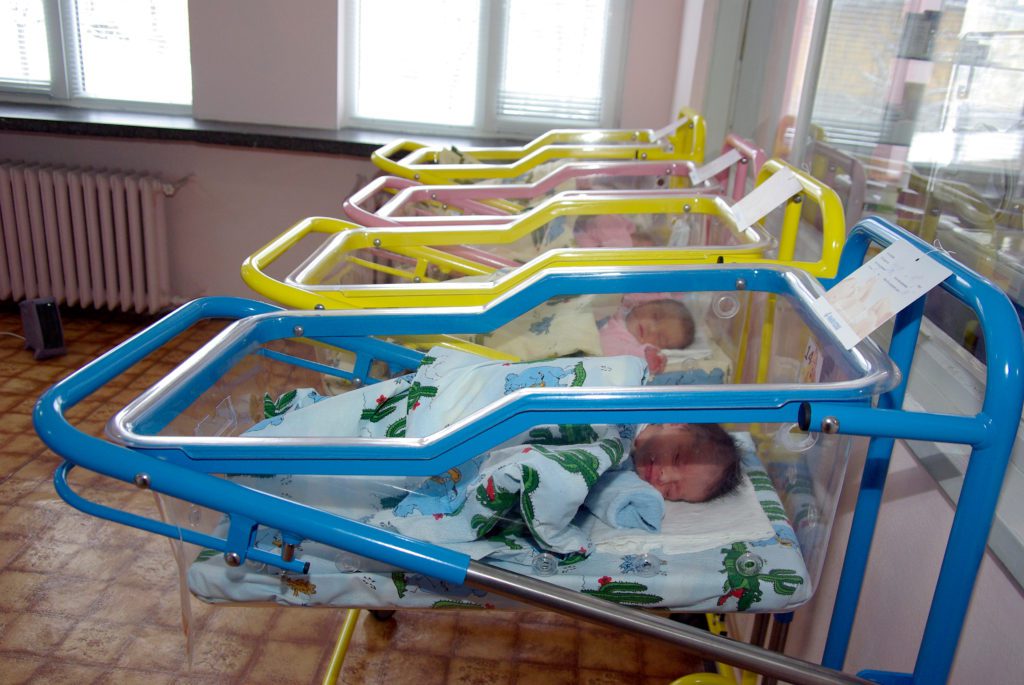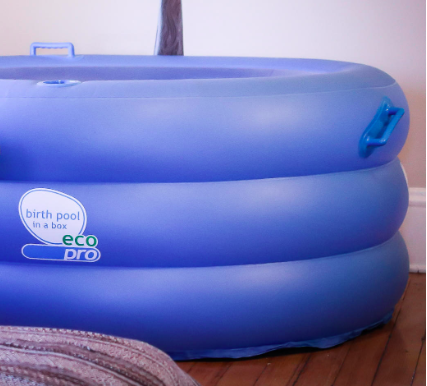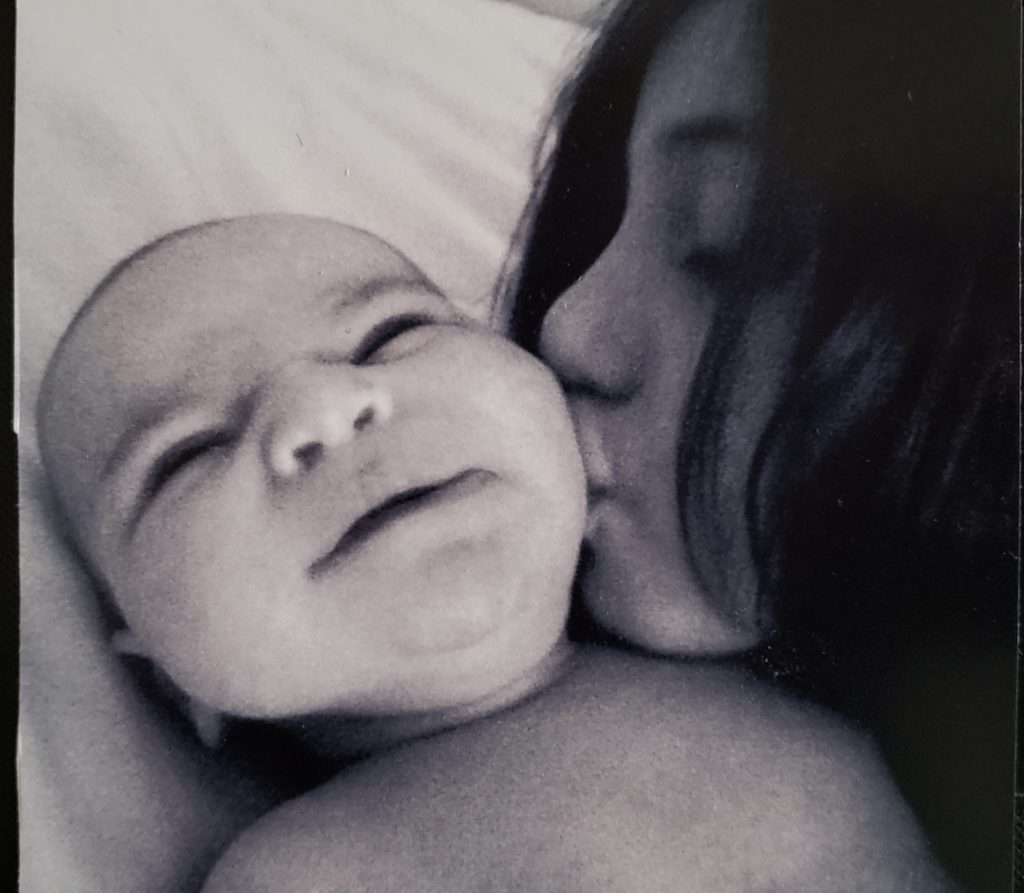Your Birth, My Day
by Sara Spielman
When my first daughter was born on my birthday, it was the best birthday gift ever – except I had a difficult time unwrapping my present.
During my second stage of labor I seemed unable to release her from my womb. Was it fear of letting go? There were other factors, too, though. It was a hospital birth and so I was hooked up to IV with a monitor tightly strapped to my belly and the bed seemed the only place willing to hold my heavy, aching body. On my back, slightly hoisted up in bed, I played tug of war with a nurse who held a thick piece of elastic as traction for my weak hands. My obstetrician poked his head in the room every now and then asking if I needed his help. After two hours I asked him about my options.
“Vacuum suctioning or forceps,” he said.
“Will you have to cut me?” I asked.
“No way to tell before,” he answered.
I was unwilling to take the chance. Also, after two hours of intense pushing without any use of pain medication or anesthesia I wanted to finish by myself. He said the baby seemed to be doing fine and as long as I wanted to continue on my own, he was ok with it.
This attitude is extremely rare in today’s maternity wards. Not many doctors would allow a laboring woman who is fully dilated to push for four hours – yet that is what it took for me to birth my daughter without any assistance (besides a very patient nurse.)
Afterwards, I thought I had a very successful birth experience and in many ways I did. I didn’t think too much about the lack of privacy, the uncomfortable accommodations, the use of machines, drugs and technology in the birthing process… The one moment that gripped me, though, was the night following the birth when I was moved to recovery and the nurses took my baby with them. At some point, I painfully trotted down the hallway and saw a tiny newborn looking at her reflection in the glass bassinet in a nursery filled with naked crying babies waiting to be cleaned.
Was that my baby? I was pretty sure it was. Could I have known the trauma of those early moments when a baby is facing a cold, strange world, no longer in the warm, protective bubble of the womb?

Four years later, I was pregnant with my second daughter and I thought back to my first birth and the long, inexplicable hours of pushing.
Why didn’t I just get onto my feet and let gravity work the baby down? I felt cheated – no epidural, but still didn’t quite feel like a “natural birth.” The fluids running through my veins, the discomfort of IV and monitoring, a blur of the actual birth when the doctor arrived on the scene with his tools and team of nurses, left me with an overall feeling of disconnect. A believer in attachment parenting now, I also wondered how my baby handled those early hours of life without her mother’s warm embrace.
It was for these reasons that I felt, during my second pregnancy, I couldn’t go back to the doctor I trusted at one of the top hospitals in New York City. I began interviewing doulas and stumbled upon the idea of homebirth. At the time it sounded risky – but liberating and exciting.
“The Business of Being Born,” a documentary by Ricki Lake exploring the broken system of maternity wards, happened to be screening in theaters then. I took my mother to see it and we left basically convinced about the unfriendly practices hospitals have adopted to keep women having babies quickly, beds available for the next shift and doctors home in time for dinner – even if it means unnecessary cesareans.
I set up an interview with an experienced homebirth midwife and when she arrived at my home for the consultation, I was instantly drawn to her confidence and cheerfulness. With her I felt safe. As I became more excited about having a homebirth, I also wanted to understand what complicated my first birth. I didn’t want the fear of separating that held me back last time.

So I began to envision my upcoming birth. I wrote a detailed birth plan – things to resolve, changes to make and an experience to embrace. Even without taking one test or sonogram during pregnancy, I remained positive about my body’s natural ability to birth my baby. I began a process of undoing some of the fearful thinking that had prevented me from experiencing motherhood on a more blissful level. I also began internalizing the belief that birth – as with other aspects of life – is very much a self-fulfilling prophecy. My state of mind will determine its outcome.
Friday night the week spring arrived, I lit Shabbat candles and began feeling signs of labor. I sat on the couch reading a newspaper as my almost-five-year-old daughter played in the empty birthing pool my husband had pumped up earlier. We wouldn’t fill it with water until I was ready to get inside so that the water would be warm.
In the meantime I had a slight problem: I hadn’t prepared a Shabbat meal. Since I didn’t know I was in labor until Shabbat arrived, I had made plans to eat the traditional Friday night meal at my parents’ house, which is a five-minute walk up-hill. My husband encouraged me to go, saying it’s healthy to stay active in labor. I felt good and therefore agreed.
“Let’s have a quick meal and then I can go home and have our baby,” I laughed.
As we walked, along with my daughter, each step became increasingly difficult.
“I think we’re walking the wrong way,” I told my husband as I grabbed his hand
during a surge.
When I entered my parents’ house it didn’t take long for my parents and siblings to realize what was happening. As we gathered around the table, my mother began timing contractions. Five minutes apart. Now two minutes apart.
“You better call your midwife,” everyone was saying.
I dialed her number. “Can I eat a meal?” I asked.
“Eat whatever you feel like,” she answered. “I’m going to take a nap. Call me when you’re home and set up in the pool.”
I ate a forkful, then leaned my head into the table, quietly moaning. Everyone became silent. After the surge peaked, I giggled at their expressions. “It’s ok,” I said.
My father, a medical doctor, looked concerned. “She’s having the baby within the next ninety minutes,” he said to my husband. “You need to get her home.”

My thighs were feeling tingly. My brother, who helped patrol the neighborhood, had a siren and lights in his car, which came in very useful that night. I gave my daughter a hug goodbye (she would be sleeping over there), left with my husband as my sister threw some wrapped food into my hands, and got into the car.
My brother took the red lights. When we reached my building, my husband led me to the elevator. I felt the baby descending. There was lots of pressure and intensity. At home, my husband began filling the pool as I called my midwife and quickly changed into my maternity tankini. Leaning on the couch in the dimly lit family den, I called for my husband with each wave. He dropped the hose leading from the bathroom to the den, running towards me to massage my lower back.
Then he realized something. He forgot to insert the lining into the rented pool, which is hygienically necessary.
“Take out the water,” I said. “We’ll refill it.”
We were running out of time, though. Luckily my mother arrived with two of my sisters.
“We need help,” my husband explained. Soon all four of them were bucketing the water out. I was moaning loudly. My mother and husband took turns massaging me during contractions. When the water was out and the liner inserted, my sister held the hose in place by the sink as the hot water sprayed her all over.

Then the pool was filled. I gratefully glided in. As a surge ended, my midwife arrived.
“You got me at a good moment,” I said smiling.
I asked her to check the baby’s heartbeat and so she dunked her Doppler into the water and the heartbeat echoed throughout the room. She checked nothing else and yet as my sisters were leaving she said, “I’m just letting you know she’s about to have her baby.”
“So stay,” I told them. They hung out in the dining room with my mother and I still had my privacy in the closed room. I leaned over the soft edge of the pool. My midwife applied pressure to my back.
“I think I’m pushing,” I suddenly said. She assured me it was ok.
Using the power of the surges to push, my arms hung outside the pool and my body floated atop the water with my feet pushing against the walls.
There was a moment of extreme intensity. The force of the baby on the brink of emerging was overwhelming. I felt that old fear creeping in again. “I can’t…” I cried out.
“Just one more push and the baby will be on your chest,” my midwife answered.
And then I felt my baby glide out of me. Next thing I remember I was holding my sweet newborn in the warm water. I unwrapped the cord from around its body and lifted her above the water. A girl. She let out a soft, gentle cry and then began cooing and looking around. I was laughing, glowing, talking to my husband, mother and sisters who rushed into the room when they heard her cry.
My midwife held up a clear, stretchy thing that looked like a wet bag.
“Your bag of water never broke. The baby was born in the sack.
This doesn’t happen in hospitals. Doctors usually break the woman’s amniotic sack before she delivers. [editors note: this can happen in the hospital with the right provider!]
My husband stood outside the pool. My midwife encouraged him to feel the pulsing umbilical chord, which was still connecting my baby to my placenta. I felt it tugging gently from within. It was giving her rich nutrients and blood. In the hospital it is cut immediately.
After a half hour, I began cramping slightly. I expelled the placenta into the pool and then my midwife clamped the cord. My husband took the baby to the next room, which was dark except for the Shabbat candles flickering. He sang to her some Jewish melodies.
My midwife and my mother led me to my bed. I was so happy to be in my sacred space, surrounded by my loved ones. I nursed my baby and talked about the birth.
It began to rain hard. Echoes of thunder and flashes of lightening filled the room.
Everyone soon left. My husband got into bed. I snuggled close to my baby beside me.
She was wrapped in cotton blankets and smelled so sweet.
The next morning sunshine poured through the windows. The first pink buds of spring were sprouting on all the trees. My mother arrived early with my oldest daughter, who was brimming with excitement. Then my neighbor came with strawberries and cream in beautiful dishes. Later she sent sushi, salads and chicken. My sisters, mother-in-law and sisters-in-law visited throughout the long Shabbat afternoon.
I was home and blissful with my baby.

About Sara
Sara Spielman is a doula and writer based in NY. She believes that women should have informed choice in birth and looks forward to supporting women in their journeys of birthing their babies into the world. You can reach her at Saraespielman@gmail.com.
What if birth could be one of the most ecstatic, pleasurable and positive experiences of your life?
Our new ebook will guide you through the ABCs of Orgasmic Birth, how to use pleasure as a tool for birth and a bonus real-life orgasmic birth story.

